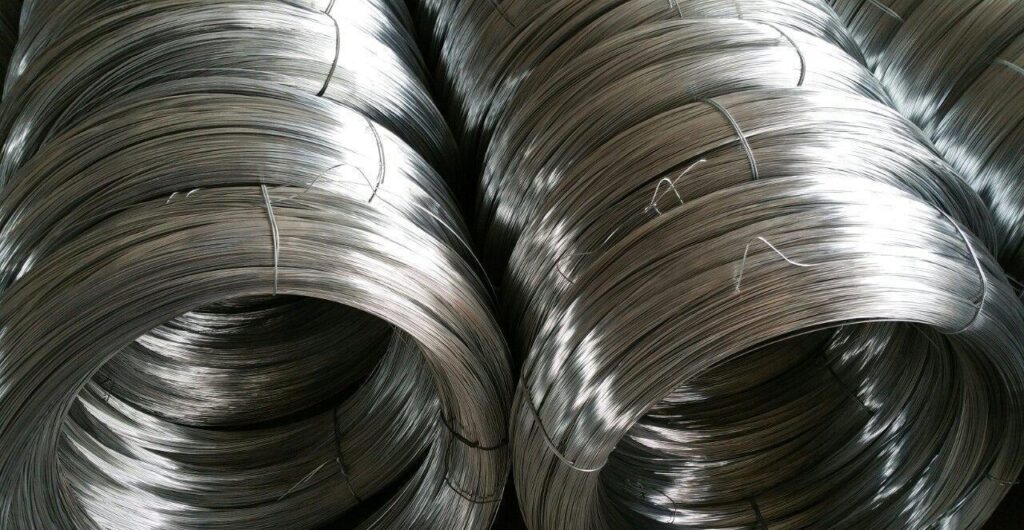Stainless steel wires are indispensable across various industries due to their exceptional strength, corrosion resistance, and durability. Different types of stainless steel wires serve unique applications, providing solutions in sectors from aerospace to medical and automotive to food processing. Here’s an overview of the primary applications of stainless steel wires in key industries.
Marine Industry
The marine industry heavily relies on stainless steel wires for applications that require excellent corrosion resistance and strength to withstand harsh saltwater environments.
Applications in the Marine Industry
Mooring and Rigging: Stainless steel wires provide strength and durability in mooring and rigging applications, allowing vessels to remain secure even in turbulent waters.
Lifelines and Safety Railings: Ships use SS wires in lifelines, safety railings, and guard rails, providing essential safety measures for crew and passengers.
Fishing Equipment: Fishing nets, traps, and hooks often utilize these to prevent corrosion from constant saltwater exposure, thus increasing their lifespan.
Automotive Industry
Stainless steel wires play a crucial role in automotive manufacturing. Specifically, they meet the industry’s need for strong, lightweight materials that are resistant to corrosion and high temperatures.
Applications in Automotive Industry
Exhaust Systems: Manufacturers use stainless steel wire to construct exhaust systems due to their ability to withstand high temperatures and resist corrosion from exhaust gases.
Spring Manufacturing: Manufacturers commonly use stainless steel wires to make automotive springs, including suspension and valve springs, which must endure high stress and cyclic loads.
Fasteners and Connectors: SS wire provides strong, durable fasteners and connectors that ensure reliable connections in engine components and electrical systems.
Wiring in Hybrid and Electric Vehicles: As the automotive industry advances, manufacturers increasingly use stainless steel wires in hybrid and electric vehicle wiring due to their durability and resistance to high temperatures.
Medical Industry
The medical industry requires materials that are not only corrosion-resistant but also biocompatible, ensuring they do not react with body tissues. Stainless steel wires meet these standards and are widely used in various medical applications.
Applications in the Medical Industry
Surgical Instruments: SS wire is essential for crafting surgical instruments due to its strength and ability to withstand sterilization processes without degrading.
Orthopaedic Implants: Manufacturers use these in orthopedic implants and fracture fixation devices, including screws and pins that hold bones together during the healing process.
Dental Braces and Appliances: These products are widely used in dental braces and other orthodontic appliances. They are flexible yet strong, allowing for adjustments without breaking.
Catheters and Guide Wires: Stainless steel wires serve as guide wires in minimally invasive surgery and catheterization procedures, providing stability, control, and safety for medical practitioners.
Aerospace Industry
The aerospace industry demands materials that withstand high stress, extreme temperatures, and varying environmental conditions. Stainless steel wires are ideal for these applications due to their strength, resilience, and resistance to corrosion.
Applications in Aerospace Industry
Cable Assemblies: Stainless steel wires are used in cable assemblies for various aircraft systems, including control cables that operate ailerons, rudders, and other essential components.
Landing Gear Components: Landing gears rely on this for certain components that must handle extreme pressure and impact upon landing.
Fuel and Hydraulic Systems: Stainless steel wires ensure secure, corrosion-resistant connections in fuel and hydraulic systems, where safety and reliability are crucial.
Aircraft Fasteners and Springs: Stainless steel wire provides durable fasteners and springs that resist fatigue and corrosion, ensuring stability in high-altitude and high-pressure environments.
Food and Beverage Industry
The food and beverage industry requires non-reactive, easy-to-clean, and corrosion-resistant materials, especially given the exposure to moisture, chemicals, and various food acids. Stainless steel wires meet these requirements, making them valuable in this sector.
Applications in the Food and Beverage Industry
Conveyor Belts: These products are widely used in conveyor belts for food processing, providing a sanitary and corrosion-resistant surface for transporting food items.
Wire Racks and Baskets: Stainless steel wire is used in wire racks, baskets, and trays for food preparation and cooking due to its heat resistance and easy-to-clean surfaces.
Filters and Sieves: In beverage production, this create filters and sieves, ensuring purity and consistency in the final product.
Storage Tanks and Pipelines: This product is also used to construct storage tanks and pipelines, which must be corrosion-resistant to maintain food safety standards.
Construction Industry
Stainless steel wires provide both structural support and aesthetic elements in construction. Their strength, durability, and resistance to weathering make them suitable for various applications.
Applications in Construction Industry
Structural Cables: This product serve as structural cables in bridges and buildings, offering support while also enhancing the architectural design. In particular, their high tensile strength allows them to bear significant loads, ensuring stability in large structures.
Railing and Balustrades: People use stainless steel wires in railings and balustrades, providing safety, aesthetic appeal, and durability against outdoor weather conditions.
Reinforcement for Concrete: In some projects, ss wires reinforce concrete structures, adding strength and longevity to constructions exposed to high moisture.
Façade Systems: People also use stainless steel wires in façade systems for decorative purposes, creating intricate patterns and designs while maintaining strength and resilience.
Electronics Industry
The electronics industry values stainless steel wires for their electrical conductivity, heat resistance, and durability. Consequently, these properties make them particularly valuable in various electronic components and assemblies. For instance, manufacturers often use ss wires in connectors and terminals, where reliable performance is crucial.
Applications in Electronics Industry
Electrical Connectors and Terminals: Manufacturers commonly use stainless steel wires in connectors and terminals, thereby providing strong, durable connections that resist corrosion and ensure reliable performance. Additionally, these wires enhance the longevity of electronic devices, as their robust construction withstands various environmental conditions.
Wire Mesh for EMI/RFI Shielding: Stainless steel wire meshes effectively shield against electromagnetic and radio frequency interference, protecting electronic components.
Battery Components: In batteries, stainless steel wires are used in connectors and other internal components, ensuring efficient conduction and resistance to corrosion.
Heating Elements: Manufacturers use stainless steel wires in heating elements for appliances like toasters, ovens, and hair dryers, where they can handle high temperatures without degradation.
Agriculture Industry
Agriculture values stainless steel wires for their corrosion resistance, durability, and ability to withstand outdoor conditions. As a result, these qualities make them particularly suitable for applications in farming and animal husbandry.
Applications in the Agriculture Industry
Fencing and Enclosures: Farmers widely use ss wires in fences and animal enclosures, providing a durable and weather-resistant solution that protects livestock. Moreover, these wires offer exceptional strength, ensuring that they can withstand the pressure and force exerted by animals, thus preventing escapes or breaches.
Greenhouse Supports: For greenhouses, ss wires serve as support structures for plants, offering strength and stability without the risk of rusting in humid environments.
Vineyard Trellising: Vineyards use wires to trellis grapevines, thereby providing a long-lasting support system that withstands outdoor exposure and maintains structural integrity.
Irrigation Systems: Irrigation system components use stainless steel wire, especially where corrosion resistance is essential for long-term performance in water-rich environments.
Mining Industry
The mining industry requires materials that can handle rough conditions, abrasive materials, and chemical exposure. Stainless steel wire offers a reliable solution for many applications in this challenging environment.
Applications in the Mining Industry
Screens and Sieves: Stainless steel wire screens and sieves are essential in mining operations for sorting and filtering minerals and rocks. They offer durability and resistance to abrasion.
Conveyor Systems: Conveyor systems that transport mined materials use stainless steel wires, offering a rust-resistant, sturdy option that performs well in demanding environments.
Drill Strings and Cables: Manufacturers use SS wire in railings and balustrades, thereby providing safety, aesthetic appeal, and durability against outdoor weather conditions. Additionally, the strength of these wires ensures long-lasting performance, making them an ideal choice for both residential and commercial applications.
Safety Barriers and Mesh: Mining operations also use stainless steel wire mesh as safety barriers, which prevent debris from falling and ensure a safer working environment.
SS wires are thus an integral part of numerous industries, each benefiting from their specific properties and adapting these wires to meet unique operational demands.






More Stories
Hellstar Hoodie has become an iconic piece in
Why Should Consider Buying Dog Supplements
Importance of Compliance in Training Programs